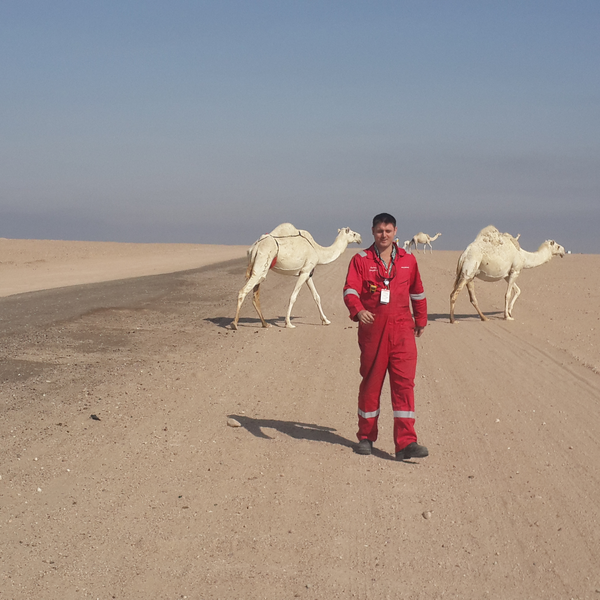Introduction
Delivered from the centre of the Energy Capital of Europe, this programme provides students with a theoretical and practical grounding in the key technologies to pursue careers in the upstream and downstream oil and gas industry.
This programme has January and September start dates. Apply Now.
MSc Oil and Gas Engineering is also available to study part time online.
Watch our webinar on MSc programmes in petroleum and oil and gas engineering.
Study Information
Study Options
- Learning Mode
- On Campus Learning
- Degree Qualification
- MSc
- Duration
- 12 months
- Study Mode
- Full Time
- Start Month
- January or September
- Location of Study
- Aberdeen
The MSc Oil and Gas Engineering is designed to create future industry leaders. The wide range of subjects taught, including engineering, geology and chemistry, ensures that you will gain a deep understanding of all the key scientific elements of the oil and gas industry and an appreciation of how these different aspects work together to deliver projects safely and efficiently.
As well as learning the principles that underpin the drilling of hydrocarbons and well production technologies (including reservoir engineering, petroleum geoscience and flow assurance) you will also learn about project management and the safety and environmental considerations involved in the oil and gas industry.
Aberdeen is known as the Energy Capital of Europe and with hundreds of energy operators and supply chain companies based in the city and surrounding region and numerous industry conferences, networking and career events taking place every year, there is simply nowhere better to gain industry exposure while studying for your energy degree.
Our industry advisory panels help ensure that the content and learning outcomes of our programmes reflect the needs of the industry while guest lectures from energy sector experts and industry-supported projects also help ensure our students’ learning is in line with industry's standards.
This degree holds accreditation from the Institution of Mechanical Engineers and the Energy Institute, ensuring that the curriculum is designed and delivered to the highest professional standards.
Available Programmes of Study
NOTE: Full-time January starts will undertake the individual project over the summer period in between the two semesters of taught courses.
- MSc
-
Oil and Gas Engineering
Qualification Duration Learning Mode Study Mode Start Month LocationMSc 12 months On Campus Learning Full Time January Aberdeen MoreMSc 12 months On Campus Learning Full Time September Aberdeen MoreProgramme Fees
Fee information Fee category Cost UK Tuition Fees for 2025/26 Academic Year £11,100 Tuition Fees for 2026/27 Academic Year £11,100 Tuition Fees for 2025/26 Academic Year (University of Aberdeen Graduates *) £7,000 Tuition Fees for 2026/27 Academic Year (University of Aberdeen Graduates *) £7,000 EU / International students Tuition Fees for 2025/26 Academic Year £26,250 Tuition Fees for 2026/27 Academic Year £26,250 Tuition Fees for 2025/26 Academic Year (Self-funded Students *) £18,250 Tuition Fees for 2026/27 Academic Year (Self-funded Students *) £18,250 Stage 1
Compulsory Courses
- Getting Started at the University of Aberdeen (PD5006)
-
This course, which is prescribed for all taught postgraduate students, is studied entirely online, is studied entirely online, takes approximately 2-3 hours to complete and can be taken in one sitting, or spread across the first 4 weeks of term.
Topics include University orientation overview, equality & diversity, MySkills, health, safety and cyber security, and academic integrity.
Successful completion of this course will be recorded on your Transcript as ‘Achieved’.
- Safety & Risk Management (EG50S2)
-
15 Credit Points
The course serves as the entrance to the field of safety and reliability engineering with the introduction of the basic concepts and tools of safety and risk management. Legal frames related to engineering safety are also introduced.
Contents include: Fundamentals of safety engineering; natural and man-made hazards; safety measures; accident and failure statistics; fundamentals of risk management; risk assessment techniques; classical reliability theory; modelling of engineering systems as series and parallel systems; redundancy; fault trees and event trees; availability and maintainability; UK safety legislation, including the Health and Safety at Work Act and its historical, offshore and other regulations.
- Carbon Capture, Utilisation and Storage (Ccus) (EG504K)
-
15 Credit Points
To develop a broader understanding of carbon capture, its pipeline transportation, utilization and safe underground storage (CCUS) in the geological formations, in terms of the fundamental concepts, their practical applications and their implementation in the ongoing projects.
- Project Management (EG5067)
-
15 Credit Points
The course provides an introduction to project management and is aimed at students who expect to be working in a project related environment or are considering a potential move into project management. The course covers a number of key aspects of project management from the project managers perspective and so whilst it does cover areas such as planning and estimating it is NOT intended to prepare students for such roles. Students are expected to apply their learning by completing a piece of group project work.
- Reservoir Engineering (EG501L)
-
15 Credit Points
The course provides an understanding of the flow of hydrocarbon fluids through reservoir rocks and the interplay between the fluid and rock properties and reservoir performance.
Stage 2
Compulsory Courses
- Fundamentals of Petroleum Geoscience (GL5534)
-
15 Credit Points
The course covers aspects of geology, geophysics and prospect evaluation to illustrate how geologists deal with uncertainty and risk during the exploration process. It will look at the place of the geoscientist during the productive life of an oilfield. Another key aspect of this course will be the issue of communication between geoscientists and engineers. By the end of this course students should understand how geologists explore for oil and gas, and the main tools at their disposal; the role of the geophysicist; how to make prospect maps; petroleum volumetrics; subsurface fluid flow; and the creation of static reservoir models.
- Flow Assurance (EG55F8)
-
15 Credit Points
There are many challenges during transport of oil and gas through pipelines. These challenges require a real grasp of the fundamentals in fluid mechanics, heat transfer, phase changes, deposition and/or obstruction, erosion and new technologies to ensure a reliable and cost effective provision of oil and gas. Deep water production, heavy oils, high water production, severe slugging, hydrates, sour gases, asphaltenes and waxes make this task even harder. This course will provide a detailed explanation of the topics, a well-balanced set of tutorials with real examples, invited lectures from experienced engineers and flow assurance specific software training.
- Well and Production Engineering (EG551W)
-
15 Credit Points
This course provides students with an understanding of the engineering science and principles that underpin the drilling of oil and gas well, production technologies, design methodologies, as well as associated safety and environmental considerations.
- AI, Machine Learning and Data Science for the Petroleum Industry (EG556N)
-
15 Credit Points
Fundamental and applied aspects of artificial intelligence (AI), machine learning and data science for petroleum engineers. Use of data from sensors, digital twins and other digital domains during seismic data acquisition, drilling, wireline and logging operations, well testing, reservoir surveillance, production and other oil field operations. Students learn how to optimise sustainable subsurface petroleum production using AI and data science tools to realize net-zero energy future.
Stage 3
Previous examples of projects:
- Modelling of down hole drilling fluid temperature profiles during drilling operations - Nemein Ltd
- Evolution of Hydraulic Fracturing Technologies for Horizontal Wells - AGR
- Corrosion Resistant Alloy Tubing Equipment and Running Recommendations - Tenaris Global Services
- Creating an Integrated Asset Model for the Greater Stella Area (GSA) - Petrofac
- Well Test Analysis and Numerical Modelling for an HPHT Gas Field - Chevron
Compulsory Courses
- MSc Individual Project (EG59F1)
-
60 Credit Points
The MSc Individual Project is an independent piece of research based on a topic related to a student’s degree programme. Students are encouraged to focus on a problem confronting industry or a related area. The individual project provides students with an opportunity to demonstrate how the in-depth skills and knowledge they have gained during the taught courses can be used to provide solutions to practical problems. The individual project should contain a degree of original research.
Programme Fees
Fee information Fee category Cost UK Tuition Fees for 2025/26 Academic Year £11,100 Tuition Fees for 2026/27 Academic Year £11,100 Tuition Fees for 2025/26 Academic Year (University of Aberdeen Graduates *) £7,000 Tuition Fees for 2026/27 Academic Year (University of Aberdeen Graduates *) £7,000 EU / International students Tuition Fees for 2025/26 Academic Year £26,250 Tuition Fees for 2026/27 Academic Year £26,250 Tuition Fees for 2025/26 Academic Year (Self-funded Students *) £18,250 Tuition Fees for 2026/27 Academic Year (Self-funded Students *) £18,250
We will endeavour to make all course options available. However, these may be subject to change - see our Student Terms and Conditions page. In exceptional circumstances there may be additional fees associated with specialist courses, for example field trips.
Funding Opportunities
- Shell U.K. Limited is offering three £20,000 scholarships for students starting a Masters programme aligned with the Centre for Energy Transition (CET) commencing in September 2024. Find out more
- NEO Energy, an independent full-cycle energy business in the UKCS, are offering two postgraduate scholarships in a variety of taught degree programmes at the University of Aberdeen. Each scholarship is valued at £20,000. Find out more.
Scholarships
All eligible self-funded international Postgraduate Masters students starting in September 2025 will receive an £8,000 scholarship. Learn more about this Aberdeen Global Scholarship here.
To see our full range of scholarships, visit our Funding Database.
How You'll Study
Learning Methods
- Field Trips
- Group Projects
- Individual Projects
- Lectures
- Research
- Tutorials
Assessment Methods
The principal method of student assessment is through written examinations. Examinations for the first term courses are in December and those for the second term are in May. MSc candidates must submit a dissertation on their project.
Why Study Oil and Gas Engineering?
- This programme is designed to create future leaders of the industry and the range of subjects taught ensures that you will have a strong appreciation of all key elements of the industry lifecycle and of the different areas of engineering required, as well as how they work together to deliver projects safely and efficiently.
- You will gain crucial technological skills as well as knowledge in safety and risk management, time management, planning and communication.
- The programme is fully accredited by IMechE and Energy Institute which means you can be assured that your teaching is recognised by relevant bodies and that you are getting the best possible experience.
- Our location at the heart of Aberdeen, Europe's energy capital, and leading "World Energy City", brings you closer to the industry. Aberdeen is an inspiring place for future energy industry leaders.
- Our location and industry links also put us in a unique position of offering a curriculum that is highly relevant to the needs of employers and means you develop crucial industry links while studying the programme.
- To ensure that the degree programmes remain current and connected to industry, the programme is developed and reviewed by an Industry Advisory Board, made up of experienced professionals from a range of backgrounds.
- Our close links with industry ensures that you experience lectures taught by industry professionals, get the chance to visit relevant organisations, attend industry events, and undertake MSc projects with leading firms.
- Our engineering programmes attract students from around the world, all sharing a common interest and passion for the future of oil and gas exploration and production, and the engineering skills required to make it a continued success.
- Our graduates move into very successful careers with a large proportion working in senior roles in the industry.
- The Centre for Energy Transition (CET) at the University of Aberdeen is undertaking technical research to find energy solutions compatible with the UN Sustainability Goals and to provide the relevant skills training to support people and communities who seek to deliver the energy transition.
Entry Requirements
It is important to note that the programmes of postgraduate study at the University of Aberdeen are very competitive and the entry requirements stated are a guide to the minimum requirements, but do not guarantee entry.
Qualifications
The information below is provided as a guide only and does not guarantee entry to the University of Aberdeen.
-
2:2 UK Honours degree, or an Honours degree from a non-UK institution which is judged by the University to be of equivalent worth in any branch of Engineering or Physics.
-
Key subjects you must have covered: Mathematics.
Academic Technology Approval Scheme (ATAS) Certificate
The CAH3 code for this degree is CAH10-01-09. Students who need a visa to live or study in the UK must to apply for ATAS clearance. The ATAS clearance certificate must be valid when you apply for a visa to enter the UK. To find out if you need to apply for ATAS clearance, please visit www.gov.uk/guidance/academic-technology-approval-scheme
Please enter your country or territory to view relevant entry requirements.
Aberdeen Global Scholarship
Eligible self-funded Postgraduate Taught (PGT) students will receive the Aberdeen Global Scholarship. Eligibility details and further information are available on our dedicated page.
Aberdeen Global ScholarshipEnglish Language Requirements
To study for a Postgraduate Taught degree at the University of Aberdeen it is essential that you can speak, understand, read, and write English fluently. The minimum requirements for this degree are as follows:
IELTS Academic:
OVERALL - 6.5 with: Listening - 5.5; Reading - 5.5; Speaking - 5.5; Writing - 6.0
TOEFL iBT:
OVERALL - 90 with: Listening - 17; Reading - 18; Speaking - 20; Writing - 21
PTE Academic:
OVERALL - 62 with: Listening - 59; Reading - 59; Speaking - 59; Writing - 59
Cambridge English B2 First, C1 Advanced, C2 Proficiency:
OVERALL - 176 with: Listening - 162; Reading - 162; Speaking - 162; Writing - 169
Read more about specific English Language requirements here.
Document Requirements
You will be required to supply the following documentation with your application as proof you meet the entry requirements of this degree programme. If you have not yet completed your current programme of study, then you can still apply and you can provide your Degree Certificate at a later date.
- CV
- an up-to-date CV/Resumé
- Degree Certificate
- a degree certificate showing your qualifications
- Degree Transcript
- a full transcript showing all the subjects you studied and the marks you have achieved in your degree(s) (original & official English translation)
- Personal Statement
- a detailed personal statement explaining your motivation for this particular programme
Careers
An understanding of all aspects of the industry means that students have a well-rounded knowledge which will support them in their careers, regardless of their chosen career path. The programme is internationally relevant, with careers available around the world and graduates of the Oil & Gas Engineering Programme have pursued the following careers.
Career Opportunities
- Directional Driller
- Drilling Engineer
- Drilling Operations Support Engineer
- Field Engineer
- Graduate Design Verification Engineer
- Process Engineer
- Safety Engineer
Accreditation
This degree holds accreditation from
What our Alumni Say
Our Experts
- Programme Coordinator
- Dr Roozbeh Rafati
- Other Experts
- Dr Henry Tan
- Dr Lateef Akanji
Information About Staff Changes
You will be taught by a range of experts including professors, lecturers, teaching fellows and postgraduate tutors. However, these may be subject to change - see our Student Terms and Conditions page.
Get in Touch
Contact Details
- Address
-
Student Recruitment & Admissions
University of Aberdeen
University Office
Regent Walk
Aberdeen
AB24 3FX






